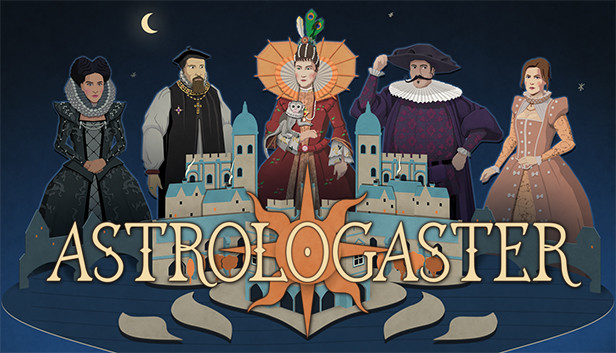

Simon Forman was an eccentric fellow who lived during the Elizabethan era. He practiced as a doctor, although seeing as his focus was astrology, his methods weren’t exactly orthodox. He married a young wife, but frequently cheated on her due to a voracious sexual appetite. He had a run-in with the Royal College of Physicians, who wished to ban him from medical practice. He then died on the River Thames, as he seemed to predict beforehand.
This is important background information on who Simon Forman was, because this review focuses on a game all about his life. Astrologaster came out a few weeks ago for PC and mobile platforms, and you play as Forman as he went about treating his patients.

ACT 1: IN WHICH THE PREMISE IS EXPLAINED
The overarching story of Astrologaster is that pesky run-in with the Royal College. They’re threatening to shut him down, and the only solution to this is to collect eight letters of recommendation from his patients. Collect all eight and Cambridge University will then issue him a medical license. To do this, you must listen to the troubles of your ‘querents’ and use the power of the stars to diagnose them.
Not that the use of astrology is presented in a difficult way. The readings boil down to choice, and the player gets two or three diagnoses based on Forman’s star charts. Do you diagnose someone with a stomach ache, or pregnancy? Do you urge a young female writer to sabotage Shakespeare’s career in favour of her own? That kind of thing.

ACT 2: IN WHICH CRITICISMS ARE GIVEN
This is where Astrologaster has a slight problem. As a game, it’s not very good. These choices often feel too limited, being binary choices that don’t always feel like they relate to the dialogue that precedes them. There are also too many instances where the choices lead to unexpected consequences. For instance, following some dialogue involving a woman concerned about a stalker, I picked what seemed to be a reassuring answer. Instead she went running out of the building, unhappy with my answer.
More could have been done to make the star charts feel less like fancy dressing for basic choices. For instance, they could present the entire star chart to piece together plausible answers. Having to seek the answer out more would make things more engaging than the current system . Although how this would work in context of the responses could be tricky to develop.
There is also no other gameplay. It’s a single choice per chapter, and that’s all you get. No puzzle-solving, no unexpected choices, and no chance to delve deeper into the Elizabethan setting.

ACT 3: IN WHICH THE GAME IS REDEEMED
However, approaching this as a game doesn’t do it justice. Because as a storybook with occasional interaction, Astrologaster is brilliant. And storybook is the correct word to use, as this is the game’s aesthetic. You drag the corner of the screen like you’re turning a page, and the backgrounds lift in like they’re made of folded card. It does give the characters limited animation, but this also gives the game a slight theatrical vibe.
And very good performances they are too. British voice actor David Jones plays Forman, and does an excellent job bringing this well-meaning but useless protagonist to life. Support performances are also brilliant across the board, with some issues around a character with an Italian accent. That said, this wonky Italian is possibly deliberate, so it can be forgiven.

ACT 4: IN WHICH THE WRITER IS PRAISED
And then, the writing. The thing that holds all this together as a cohesive experience. It’s a cheeky representation of Elizabethan values and language, with pointed criticism of things like the place of women in society at the time. You have characters like Signor Ferraro, who brings a new bizarre ailment each time he visits. Or there’s Devereux, who reminds me of a reined-in Lord Flasheart from Blackadder. Then there are lines like “coitus post consultatio” in the case notes that tell another story of their own.
Then there’s the songs between each consultation, that mark the arrival of the next patient. Sung by a small choir and based on music of the time, the lyrics are a masterpiece. For example, the song drawing on odd beliefs around mirrors in some circles sees them rhyme “glass” with “Satan’s fa-la-la-la”. The amount of care and love put into the script by lead Katharine Neil is more than enough to make up for the game’s flaws.

ACT 5: IN WHICH A CONCLUSION IS REACHED
Astrologaster is one of the funniest gaming experiences I’ve ever played, and it’s for this alone that I can recommend it. If you like British comedy and Elizabethan history to even a marginal degree, you need to play Astrologaster. Just don’t expect a deep gameplay experience while you do so.

Leave a Reply